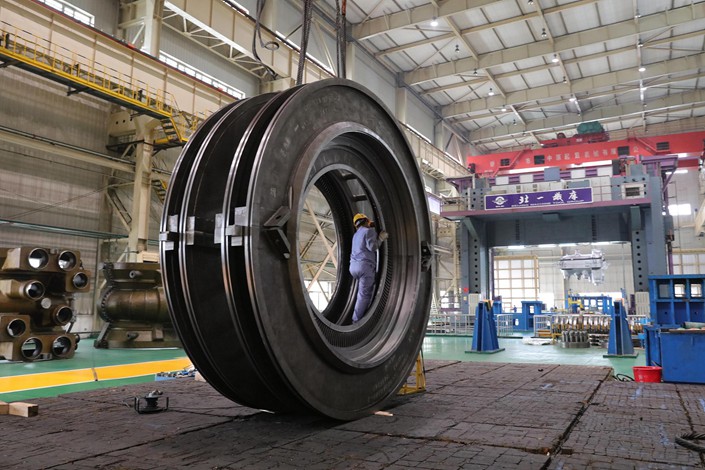China Sticks to High-Tech Overhaul, Despite Drawing U.S. Ire

The high-tech industries linked to “Made in China 2025,” the industrial policy driving trade tensions with the U.S., will be front and center in the next stage of China’s strategy to overhaul its bloated state sector.
The continued focus this year on industries that include the industrial internet and new-energy vehicles (NEVs) indicates that Beijing isn’t giving up on its ambitions to upgrade its industrial sector, despite objections from its largest trading partner amid an escalating trade war.
In the second half of 2018, state capital will continue to move away from the heavy industries that dominate China’s state sector toward “key industries within national strategies,” according to a report released Tuesday by the state-run China Securities Journal, based on a meeting between the State Council and the State-Owned Assets Supervision and Administration Commission (SASAC).
Companies in the equipment manufacturing, coal, power, communications and chemical sectors are to continue to restructure, with leading enterprises to guide “collaborative development platforms” for sectors including industrial internet, new-energy vehicles (NEVs), and BeiDou Navigation Satellite System, China’s satellite navigation technology, according to the report.
Industrial internet, a term originally coined by U.S. conglomerate General Electric Co., refers to the integration of machinery with sensors and using the deluge of new data collected to increase efficiency. BeiDou, China’s homegrown rival to the U.S.-based navigation service GPS, saw its 32nd satellite launch earlier this month.
“Made in China 2025,” which is designed to upgrade China’s technological manufacturing capabilities, was not mentioned directly in the report, although industrial internet, NEVs and satellites are all important parts of the initiative.
The meeting also called for reducing industrial overcapacity and continuing to integrate state-owned assets in the coal and steel sectors, among others. A special fund to help with integrating state-owned coal assets will also be set up.
SASAC will also continue pushing mixed ownership reform, aimed to boost the efficiency and competitiveness of lumbering SOEs with the help of private capital. More than 88 billion yuan ($13.14 billion) in private capital was injected into SOEs in the first half of this year, according to the paper.
Contact reporter Ke Baili (bailike@caixin.com)

- 1Cover Story: China Carves Out a Narrow Path for Offshore Asset Tokenization
- 2Drownings Shake Chinese Enthusiasm for Travel to Russia
- 3China Business Uncovered Podcast: A $15 Billion Bitcoin Seizure and the Fall of a Cybercrime Kingpin
- 4Over Half of China’s Provinces Cut Revenue Targets
- 5Li Ka-Shing’s Port Empire Hit by Forced Takeover Amid Panama Legal Dispute
- 1Power To The People: Pintec Serves A Booming Consumer Class
- 2Largest hotel group in Europe accepts UnionPay
- 3UnionPay mobile QuickPass debuts in Hong Kong
- 4UnionPay International launches premium catering privilege U Dining Collection
- 5UnionPay International’s U Plan has covered over 1600 stores overseas






